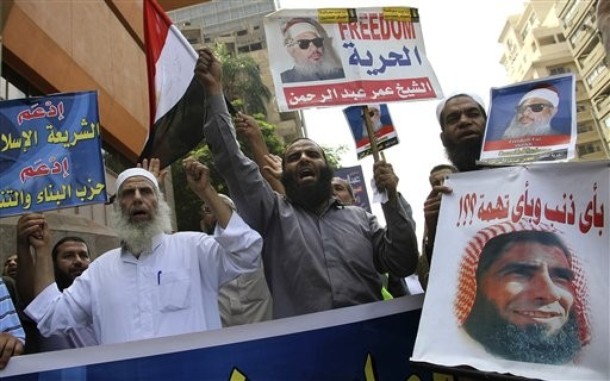
Blogger and activist Alaa Abdel Fattah was summoned to appear before a military prosecutor on November 1, sparking large-scale protests in Cairo and Alexandria, where thousands gathered to demand his release and an end to military trials of civilians. Meanwhile, the Higher Electoral Commission announced that the official campaign period for parliamentary elections will begin on November 2. As the debate over legal reform continues, Deputy Prime Minister Ali Al-Selmy invited around 500 representatives of different parties and movements to a meeting to discuss proposed supra-constitutional principles and establish criteria for selecting members of the 100-member constituent assembly that will draft a new constitution after parliamentary elections, but most Islamist forces including the Brotherhood’s Freedom and Justice Party refused to attend.
PROTESTS/MILITARY TRIALS:
The detention of blogger and activist Alaa Abdel Fattah has sparked large-scale protests in Cairo and Alexandria. Thousands gathered in Cairo’s Talaat Harb Square to demand an end to military trials of civilians and call for the release of El-Fattah, who was summoned to appear before a military prosecutor on November 1. [Al-Ahram, English, 11/1/2011]
Islamist presidential candidate Mohamed Selim el-Awa called for the release of detained blogger Alaa Abdel Fattah and also condemned the continued use of military courts to try civilians. [Al-Ahram, English, 11/1/2011]
A military court sentenced 73 protesters to serve suspended sentences of six months, for involvement in the clashes outside of the Israeli embassy on September 30. The defendants were accused of attacking military police during the demonstration. [Al-Ahram, English, 10/31/2011]
ELECTIONS:
The official campaign period for parliamentary elections will begin on November 2, according to Chairman of the Higher Electoral Commission, Abdel Moez Ibrahim. Candidates are required to cease all campaign activities 48 hours before polling starts on November 28. The final lists of candidates approved to run in the elections will also be announced on November 2. [Al-Masry al-Youm, English, 11/1/2011]
Coptic Pope Shenouda has banned parliamentary candidates from using churches for campaign activities and urged Coptic candidates not to mix religion with politics or use religions slogans. Nineteen Christians are running for the People’s Assembly and Shura Council in Alexandria alone, but Coptic activist Mamdouh Nakhla observed that Copts are increasingly disinclined to participate in the upcoming elections, either as candidates or voters. [Al-Masry al-Youm, English, 11/1/2011]
The legislative committee of the Higher Electoral Commission formally agreed to permit Egyptians abroad to vote in the upcoming elections. [Al-Shorouk, Arabic, 11/1/2011]
LEGAL/CONSTITUTIONAL REFORM:
Deputy Prime Minister Ali Al-Selmy invited around 500 representatives of different parties and movements to a meeting at the Cairo Opera House on November 1 to discuss proposed supra-constitutional principles and establish criteria for selecting members of the 100-member constituent assembly that will draft a new constitution after parliamentary elections. SCAF Chief of Staff General Sami Anan was also invited. According to Al-Selmy, a set of supra-constitutional principles will be announced on November 1 after the meeting. The Muslim Brotherhood, al-Gama’a al-Islamiya, the Salafi Nour Party, and several human rights groups are all boycotting the meeting. Islamist groups have expressed opposition to the proposed supra-constitutional principles, which might limit their ability to define a strong role for Sharia principles in the next constitution. [Al-Ahram, English, 11/1/2011][Al-Ahram, English, 11/1/2011] [Al-Masry al-Youm, English, 11/1/2011] [Al-Shorouk, Arabic, 11/1/2011]
The Nasser-era Treason Law is expected to be reissued by the SCAF with minor revisions within days, according to Deputy Prime Minsiter Ali al-Selmi. Several political parties have called for the reactivation of the law to bar former NDP members from political activity. [Al-Dostor, Arabic, 11/1/2011]
JUDGES’ CRISIS:
Prime Minister Essam Sharaf held a meeting with lawyers and judges on November 1 that appeared to result in a resolution to the crisis between the two groups, which had developed over a controversial new draft law on judicial authority. The two parties have agreed to form a joint committee of lawyers and judges to revise the draft law, which will be submitted for approval by the next elected parliament. [Al-Masry al-Youm, English, 11/1/2011] [Al-Masry al-Youm, Arabic, 11/1/2011]
Image: 610x_51.jpg
